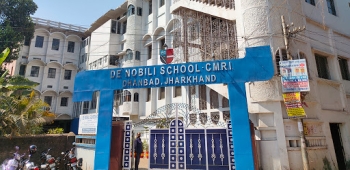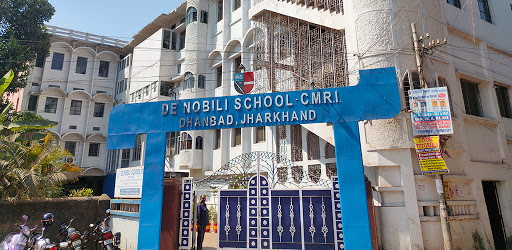
.jpg) Kuruvilla V
Kuruvilla V

The Church in India runs several educational institutions with high repute. Some of them are at the University level and are also at the secondary school level. A vast number of educational institutions are headed by priests/nuns. The institutions have been multiplying over the years. With the dwindling number of vocations to the priesthood and religious life and the aging of the present Heads, it is imperative that Bishops and Major Superiors need to search for an alternative model with a minimum number of priests/religious personnel at the helm and at the same time Christian values and unique charisms of religious congregations are imparted to teachers and students in our schools and higher educational institutions. Currently, different models are practiced in different parts of the world. We shall look at one of the models tried out in one part of our country.
Beginnings have been made in some of the dioceses and religious provinces by appointing lay persons as Principals or Vice-Principals. Most of the time it was done as no competent or qualified persons could be found as required by the Board or University. However, of late some Bishops/Major Superiors have shown interest to appoint lay persons to head our institutions provided suitable candidates are available. The Church authorities have been advocating lay partnership in educational apostolate. Church in India must dream of multiplying its educational apostolate through lay collaboration. Are clergy and religious are ready to hand over the running of the educational institutions to the hands of lay leaders? Is there fear in Church authorities/ major superiors who suspect that handing over the administration to lay leaders will end up in mismanagement? With a large number of institutions and the diminishing number of clergy/religious, the challenge in the Church is to make serious efforts to share the responsibility of running the institutions with lay persons. The time is not far when lay collaborators will be heading most of our institutions. The Church will be forced to do so due to a lack of clergy/religious personnel.
We shall look at how some of the Jesuit Provinces in India have opted for lay collaboration in their educational work. In Gujrat Jesuit Province where out of 50 schools 32 are either managed by religious sisters or lay collaborators. In Mumbai out of 10 Jesuit higher educational institutions, only 2 are headed by Jesuits. Out of 35 schools in Mumbai Province, 27 are managed by lay collaborators. The scenario is no different in other Jesuit Provinces. In the Central zone, Dumka Province has a total of 25 schools out of which 8 are run by Religious sisters. Jamshedpur province runs 32 schools out of which 7 are run by lay collaborators and 4 are by religious sisters.
Rev. Pedro Arrupe, SJ, the former Superior General, in 1980, stated that it was not the lack of Jesuits that should determine the number of Lay collaborators in our Secondary schools but the profound conviction that lay people could make a valuable contribution to our apostolates. Fr. Arrupe realized that we need multipliers, and that is what our collaborators are meant to be. He expressed his conviction in the following words: “What I have in mind is more than just a type of partnership. I am talking about offering to those lay persons who are well prepared, not just administrative assignments but the very highest levels of educational responsibility. This includes even the direction of the school as Principal or Headmaster when it is necessary or useful. We reserve to the Society only its essential role as animator and inspirator.”
We need to look for an appropriate alternative model which will enable fewer clergy/religious to manage several institutions with the help of committed lay collaborators. Church authorities and major superiors will have to begin a sincere evaluation and planning of various educational institutions within their dioceses or provinces and plan an effective way of managing them. The way forward is through lay collaboration.
The model that has been successfully working for over 40 years is the model De Nobili unit school’s system in Jamshedpur Jesuit Province. It provides ample evidence for a successful model of running Christian educational mission with lay persons not only as teachers and staff but also as school leaders.
It was Fr George Hess S.J, an American Jesuit priest and Principal of De Nobili School, FRI, in 1963, who conceived and pioneered the idea of starting the De Nobili unit schools with lay collaborators as school headmasters. De Nobili School, FRI, established in 1956, was already well known in the coalfields of Dhanbad for quality education. Hence, requests came from various Public Sector companies in coalfields, such as Eastern Coalfields Ltd., Damodar Valley Corporation, Central Mining Research Institute, Bharat Cocking Coal Ltd, and Fertilizer Corporation of India, to open the branches of De Nobili, FRI, in their respective areas. The idea was to replicate the model of De Nobili school, FRI, in those places. The companies, in turn, were ready to provide infrastructural facilities such as land, buildings, and playground to start the schools. The Management of De Nobili, FRI, would be responsible for the administration of these schools with no interference from the companies.
The first school to start with the De Nobili name was at Sijua, in Dhanbad district, Jharkhand in 1975 with Mr. V.J. Abraham, a layperson well-formed in Christian and Ignatian values, as its first Headmaster. He had been the Registrar at De Nobili school, FRI. The Principal of De Nobili, FRI, would remain the Principal of all Branch schools, and laypersons formed in Christin and Ignatian values were selected from among the teachers at De Nobili school, FRI. They were appointed as Headmasters of the branch schools. In fact, it was the beginning of the De Nobili Schools Network and was an innovative and creative idea in India in the 1970s to entrust the responsibility of running Jesuit schools to committed laypersons. In a span of six years, another five schools were opened at Mugma, Sindri, Chandrapura, Maithon and CMRI, Dhanbad, with laypersons as Heads of schools. Some of the Heads of schools were non-Christians.
Today, De Nobili schools as a network operate under the leadership of a Jesuit Director and impart quality education to 16,057 students in nine De Nobili schools with the cooperation of 434 lay teachers and employ 724 lay persons. Three rural Jesuit schools have also become part of this network. All De Nobili schools are units of De Nobili Jealgora, a registered society under the Indian Societies Registration Act 1860. A Jesuit Director is appointed to monitor the working of all 9 schools and his office is at De Nobili Bhavan in Dhanbad which is the Secretariat for De Nobili schools.
The Director conducts regular monthly meetings where common programmes and activities are planned. The meeting of all principals is an occasion to exchange views on various topics related to school education. The Governing board consisting of Jesuits is the final authority and makes major decisions that affect the schools. Regular workshops and in-service programmes are organised by the Director for teachers and the school leaders. The role of the Director is crucial as he is the appointing authority and the Secretary of the Registered Society.
In a country, which is profoundly multi-religious and multi-cultural, education is an eminent tool to bring about tolerance, cohesion, and unity among the people. De Nobili Schools, under the lay leadership, have promoted holistic Christian education while promoting our country's constitutional values and rich diversity. Six De Nobili Schools are managed by Lay principals. Out of them, three are Hindu women who have been successfully managing these schools. The network has Vice-Principal/Coordinators who belong to other faith traditions.
As we look at the brighter side of lay collaboration, it is also important to become aware of its pitfalls and challenges in running Christian schools in the multicultural context of India. With the dwindling number of Christian teachers, where can we find dedicated Christian leaders who are capable of administering our schools? Can lay collaborators who profess non-Christian religions effectively be leaders of Christian institutions? Are they able to imbibe and implement Christian values and religious charisms? Do we appreciate and accept laypersons as school leaders and work under them? Are they competent to run a Christian and a Jesuit school? Do they understand and value Christian and Jesuit goals of education?
Normally teachers who have been with the institution for a number of years and have shown their loyalty and commitment to Christian and Jesuit ideals are selected to assume leadership roles in these institutions. During the years of their service as Coordinators or as vice-principals, they are sent for training for leadership roles in schools. All of them require years of preparation to assimilate the values of Christian and Jesuit education. They are gradually inducted into the system. The selection of a person who has imbibed Christian and Ignatian values is a key element for the success of the lay collaboration/partnership. The necessary component is to provide for the training of our mission partners. The administration of educational institutions through lay collaboration has been working successfully for many years in Dhanbad and hopes that this successful model can be replicated elsewhere. Lay collaboration must become an integral part of our educational mission today.
(Kuruvila V is the Director of Education Resource Centre, Jamshedpur)